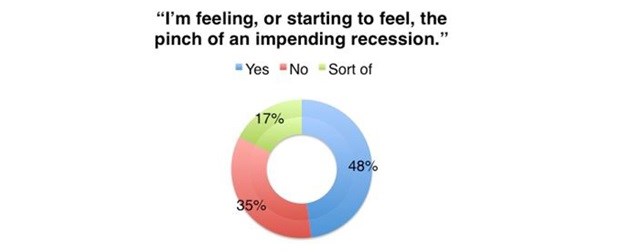Are freelance creatives feeling or starting to feel the pinch of recession, and if you are, is there anything you can do about it?
A few weeks ago I asked whether my fellow freelance creatives were feeling, if at all, the sinister pinch of an impending recession. Here, collated, is a sample of data* and responses – as well as some advice at the end.
Yes. (11 ‘Yes’ responses)
“There’s been a 50% fall in my revenue, caused by budget cuts on client-side and a drift towards amateur services. In the case of copywriting, someone in the office "does it" and in the case of photography, it’s younger people with a relatively inexpensive camera, an in-your-face attitude and fees up to 80% lower than the pros. There’s also the perceived importance of social media like Facebook marketing, and dumping any methods that need well-conceived content. It's blood in the streets out there.” – G
“Yes, the pinch was so bad that I’ve had to give up freelancing completely. I now work full-time for a corporate, earning less than I'm worth. I couldn’t afford to keep getting into debt month after month as I looked for more clients. Hopefully I'll return to freelancing one day though!” – T
“You should be feeling the madness, not a pinch. Media has gone mad - mad indeed. As an industry at the forefront of the digital advance we may soon be guilty of our own demise. So-called 'disruptive technologies', turning our world upside down but not replacing it with any solid business models, are not ‘disruptive'; they are ‘destructive’. I am sorry for all those who have a craft. Who have taken the hours to learn the skill required to write, take a picture, edit film, learn image editing software, compose music...” – M
“I am seriously feeling the pinch and have borrowed money off our bond every month this year just to meet household expenses. There is work, but it is slow and the rates are poor. Many of my clients have not raised their rates in years so I am still earning the same rates as five to six years ago when living expenses, etc., have not slowed down. Also, clients don’t have work so there is nothing to pass on to me. It is tough – and that is indisputable.” – N
“I’ve been struggling a bit because, while my corporate clients are amenable to annual increases, my journalism clients are still bloody well paying R2.50 a word - which is what they have been paying for the last ten years. And I have a few corporate-ish clients (who hinge their rates on journalistic rates) who have gone up to R3 per word, but grudgingly. The annual increase of fees is the relevant measure, and it just ain't happening.” - G
“Since October 2015, work has become more scarce, with regular clients telling me they’ve had to cut budgets and curtail projects. Till now, I’ve not had to draw on my savings, but every time I finish a job I wonder if I am going to get another, and how long can I last without income. The other - VERY definite - thing is that people take longer to pay. It used to be on invoice or 30 days; now I have to send reminders, and reminders, and reminders...” - N
“I am really battling to find work, so I am definitely feeling the pinch. In addition, my husband was told this week that his company is in liquidation so he is out of a job. I'm not sure if the lack of work is due to my rates or if it's a case of companies requesting quotes and only then checking their budgets. The irony is that, in tough economic times, hiring a freelancer is the most cost-effective way [for companies] to spread their messages.” – N
“I think it’s even worse now than in 2008 when I was retrenched from my job as a managing editor. I also have clients refusing to pay after-hours rates for urgent or short turn-around work, opting for someone cheaper.” – D
“The rates I charged prior to 2012 are still relevant. There has been no increase! Actually, a decrease in some instances. This is confirmation that the market is stagnant and on the decline. And I’ve just seen an article stating that Moody’s says we shouldn’t rule out a Brexit aftershock. Regardless, I remain positive and am in this for the long haul.” – R
“I’ve been feeling the pinch for the past 18 months, but maintained a ‘wait-and-see' attitude, hoping that 2016 would changes. It did not. I still have the same clients, but they’re cutting their budgets for consultant services. Therefore I can’t offer the whole shebang because they can’t pay for it.” - M
Sort of. (4 ‘Sort of’ responses)
“I was almost at the point of seeking full-time employment again this year! Jan and Feb were dead quiet. I mean: no work, at all. Being fairly new to this “game”, I put it down to the nature of the business and not the economy. A bit of work started trickling through from March, [but] I was walking away with 50% of what I had been earning. And the same held true through to June. So far, in July, I’ve been so busy, I’ve hardly had time to sleep, which I’m not complaining about as I’m trying to recover from the quiet months. I put this upswing down to marketing myself more aggressively - phone calls, networking, emailing, leveraging contacts, Facebook etc.” – K
“Now with Brexit and government clamping down on NGOs with funds from the UK, I have lost about 70% of my ‘corporate’ business. I have further noticed that the phone calls from local municipalities have stopped altogether, or start with demands for my BBBEE. Oddly enough my African wedding business is largely unaffected and becoming one of my staple forms of income with a couple of weddings every month.” – B
“In the good old days (2011-2014) I was booked up 4-6 weeks in advance. Now it’s a week or two, which is a significant drop, but still keeping me solvent and busy. Having said that, there’s been a 30-40% drop in my monthly turn-over and clients are getting increasingly picky, difficult, stingy and shirty. This is forcing me to give ‘better’ service and take more shit.” - T
No. (8 ‘No’ responses)
“I had a shocking few months, but I’m happy to say that, through social media interaction/LinkedIn, work has picked up and is diversifying.” – C
“I had a shocking start to the year, but now things have leveled out.” - L
“I’m having one of my best years since 2012; I consider myself lucky.” – S
“I don't know, maybe I am lucky, but things are going okay this side. Key has been, I think, the diversification of my operations by no longer solely focusing on mass / mainstream / traditional media.” – M
“I had a shocking first half of the year but things are picking up at the moment – surprisingly I’m still getting lots of magazine commissions.” - L
And some advice…
1. Stand fast
“When I was retrenched, I took on anything and everything just to survive while I reinvented myself and found new income streams. Now I refuse to work for free or for a lower rate than I feel I can justify in exchange for my years of experience, commitment and ability.” - D
2. Make exceptions
“Sometimes you need to accept a lower rate in order to establish a new relationship, especially if it has long-term potential. The caveat is to make it clear that the discount is once-off, based on the potential of future work, and that your usual rate will apply moving forward. If you’re good enough and deliver quality, it does the following: (1) The client appreciates the gesture, in lieu of continued work (cause they’re also feeling the pinch!); and (2) It sets the parameters for the relationship in future.” – R
3. Go social
“You can’t get away from the fact that social media marketing is taking the world by storm. More people are online than ever, and more often than not, they make their purchasing decisions based on what they’re seeing in their online “social sphere”. So not having formal training in social media marketing, I’ve attended webinars, signed up for a couple of courses and read everything I can lay my hands on about social media management…which I’m now adding to my list of services! This will hopefully start to alleviate this “pinch” I’ve been experiencing this year.” – K
4. Diversify
“I think diversification, within the realms of my background and experience of course, has helped keep my business alive.” – L
“Diversifying one's operations is crucial to one's survival as a freelancer. Have a speciality, for sure, but don't let this limit you - ever.” – M
5. Be professional
“Local business and local economy is becoming politicised and red-tape-heavy. Fortunately the big companies still have the clear-mindedness to decide who to use, which skills they believe in, and what quantifiable outcomes they expect based on experience and track records. But, chatting to local creatives I’ve noticed a trend of people entering the business of freelancing and failing because they lack actual business skills. Those who last are those who have business experience and can negotiate.” - B
6. Trim down
We look at clients’ wish-lists and trim, trim, trim down to essentials to match the budget. I don’t lower my rates. I also find that clients are looking at their own resources differently, trying to assign some of the functions that I used to provide to permanent staff with ‘spare capacity’.” - M
7. Cut costs
“This year I closed my cc (after ten years!) to cut compliance costs because my diminished turnover no longer justified the costs. I sold the cc and made a few bucks out of that. The new status did not compromise my credibility with existing clients. I also decided not to upgrade my phone, computer and other nice-to-haves at the same regular intervals as before, and to look at other options to still maintain a functional and professional outfit.” – M
8. Get inventive
“Perhaps its time we in the media put our heads together and invent a new type of business model. The old one isn't working. I would think it should be more collaborative than competitive (yes, it's hard for people who are already established to give a hand to those clinging to the edge of the lifeboat since everyone feels vulnerable); I suspect that is what is going to have to happen. If communal collaborations work in many other areas that have struggled to survive in the 21st century (art and galleries being the first to come to mind), perhaps cooperatives among media people can work, too.” – L
*Please be aware that the product of my research is likely to be blunted by my methodology; namely, that many of the freelancers who may otherwise have replied that business was good may have been reluctant to do so publicly or at all, for fear of jinxing themselves. We’re a superstitious bunch.
Got something to add? I’d like to hear it. Comment, critique, share.































